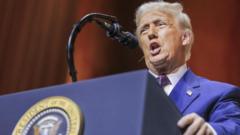In his fifth week back in the White House, President Donald Trump continued to push forward with his plan to reshape American governance and foreign relations, leading to a flurry of controversial actions and statements. Among the most notable events during the week, Trump referred to Ukraine's President Volodymyr Zelensky as a "dictator," stirring backlash from European leaders and causing alarm regarding U.S. standing on the global stage. Trump's remarks followed Zelensky's criticisms of U.S.-Russia peace negotiations that excluded Ukraine, leaving Kyiv feeling sidelined amidst the ongoing conflict.
The administration also held discussions with Russian officials in Saudi Arabia this week without Ukrainian representation, an action that could complicate diplomatic efforts to resolve the war in Ukraine. Trump's assertion that it was unnecessary for Zelensky to be present at these talks drew raised eyebrows from observers concerned about the implications for Ukrainian sovereignty.
In an unexpected diplomatic turn, U.S. and Russian authorities agreed to a prisoner swap during the week, as Kalob Byers, a U.S. citizen arrested in Russia, returned home. This event coincided with the release of Russian national Alexander Vinnik, signaling a potential thaw in relations, albeit underscored by the ongoing geopolitical strife.
On the domestic front, Trump moved to end New York City's congestion pricing initiative, claiming it burdens citizens and labeling it "dead," a statement that prompted a vehement response from Governor Kathy Hochul. The administration also publicly sought to distance itself from allegations connecting U.S. officials to Andrew Tate's case, with alleged victims raising concerns over potential interference.
Additionally, Trump lauded a drop in border arrests while intensifying efforts to reduce the size of the federal workforce, firing thousands of employees across various departments, which critics labeled as reckless. In a move aimed at women's health, Trump signed an executive order to explore ways to make in-vitro fertilization (IVF) more affordable, returning attention to reproductive rights in a polarizing manner.
Further adding to the week’s controversies, Trump clashed with the Associated Press over naming conventions related to the Gulf of Mexico, and he faced legal challenges over decisions made regarding the New York City Mayor's criminal charges and federal benefits for undocumented migrants.
This series of events illustrates the tensions and reactions to Trump's presidency as he embarks on a journey defined by both grandeur and audacity, pushing to solidify his policies while encountering fierce opposition across the political spectrum. As he prepares for further engagements and public appearances—including a notable NASCAR event—Trump's administration appears poised for another tumultuous phase.



















